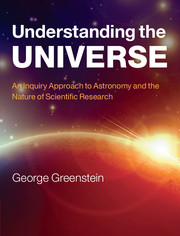Book contents
- Frontmatter
- Contents
- Preface
- Acknowledgments
- Part I Introducing steps to astronomy
- Part II The Solar System
- 6 Introducing the Solar System
- 7 The inner Solar System
- 8 The outer Solar System
- 9 Smaller bodies in the Solar System
- 10 Planets beyond the Solar System
- Part III Introducing stars
- Part IV Introducing galaxies and the Universe
- Epilog
- Appendix I The small-angle formula
- Appendix II Exponential notation
- Appendix III The Solar System
- Appendix IV The closest and brightest stars
- Appendix V Physical and astronomical constants
- Appendix VI Conversion factors
- Appendix VII Constellation maps
- Glossary
- Figure Credits
- Index
- Plate section
8 - The outer Solar System
from Part II - The Solar System
Published online by Cambridge University Press: 05 February 2013
- Frontmatter
- Contents
- Preface
- Acknowledgments
- Part I Introducing steps to astronomy
- Part II The Solar System
- 6 Introducing the Solar System
- 7 The inner Solar System
- 8 The outer Solar System
- 9 Smaller bodies in the Solar System
- 10 Planets beyond the Solar System
- Part III Introducing stars
- Part IV Introducing galaxies and the Universe
- Epilog
- Appendix I The small-angle formula
- Appendix II Exponential notation
- Appendix III The Solar System
- Appendix IV The closest and brightest stars
- Appendix V Physical and astronomical constants
- Appendix VI Conversion factors
- Appendix VII Constellation maps
- Glossary
- Figure Credits
- Index
- Plate section
Summary
In the previous chapter we studied the inner Solar System, whose planets are relatively small and dense, and are composed of rock. Now, proceeding farther outward away from the Sun, we skip over the asteroid belt to reach the outer Solar System. This is the domain of the mighty Jupiter, Saturn, Uranus and Neptune; and then tiny Pluto. (As we have mentioned, it was recently decided that Pluto is not really a planet: we will defer this question to Chapter 9, and for now we will simply call it not a planet but a “planet.”) The giant planets are immensely larger than our own, and are composed almost entirely of gas. They are utterly unlike the Earth: indeed one of them, Jupiter, can be thought of as almost a star. They are graced with lovely rings.
Like stars, these outer planets have miniature “solar systems” of their own: great numbers of moons revolving about them, just as planets revolve about the Sun. Before the advent of the space age, Earth-bound telescopes were unable to resolve these satellites, and we knew them as little more than tiny points of light. But recent space missions have revealed these satellites as being worlds in their own right, utterly unlike our own Moon – and indeed utterly unlike anything we have seen before.
Information
- Type
- Chapter
- Information
- Understanding the UniverseAn Inquiry Approach to Astronomy and the Nature of Scientific Research, pp. 214 - 247Publisher: Cambridge University PressPrint publication year: 2013
